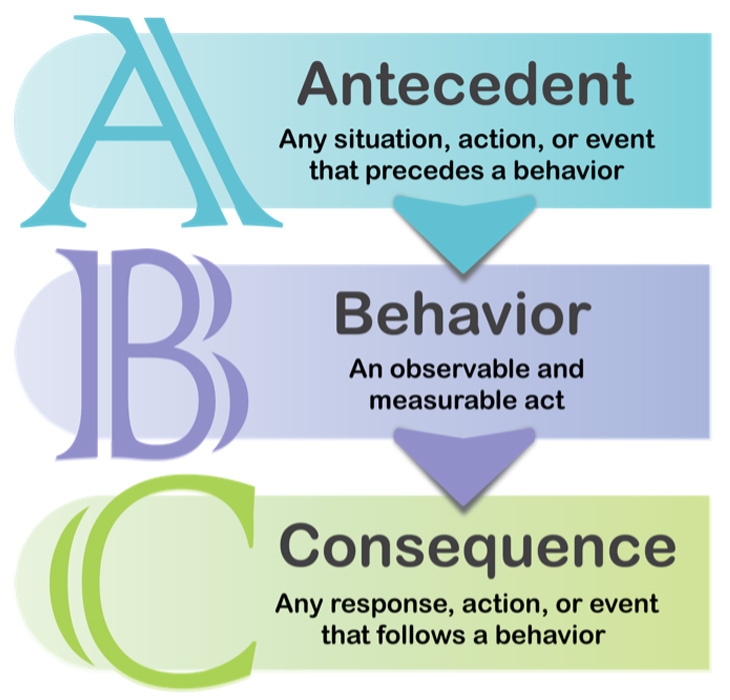What behavioral principles should educators be familiar with to understand student behavior?
Page 2: The ABC Model
A variety of factors can interact to influence a student’s behavior. They are either biological factors (e.g., genetics, medical conditions, neurology) or environmental factors (e.g., physical settings, social interactions, activities, experiences). Although biological factors can provide insight into a student’s behavior, educators should primarily focus on adjusting environmental factors within their control.
ABC (antecedent-behavior-consequence) model
A method for understanding behavior by examining the events that precede a behavior (Antecedents), the behavior itself (Behavior), and the events that follow the behavior (Consequences); the ABC model can be used to collect and analyze behavioral data to determine why a behavior occurs and to select interventions to change the behavior.
The ABC model is a common framework that illustrates how environmental factors can influence behaviors before and after they occur. The model separates behavioral occurrences into three components:
- Antecedent: Any situation, action, or event that precedes a behavior (i.e., what happens before the behavior).
- Behavior: An observable and measurable act.
- Consequence: Any response, action, or event that follows a behavior (i.e., what happens after the behavior).
Antecedents and consequences can make it more or less likely that a given behavior will happen. The table below depicts examples of classroom behaviors along with their antecedents and consequences.

| Antecedent | Behavior | Consequence |
| A teacher assigns the class a worksheet to complete independently. | The students complete the assignment. | The teacher gives the students a token based on the classroom reward system. |
| A student is playing with a peer at recess. | The student refuses to share a ball with a peer. | The peer walks away and plays with someone else. |
| A student is working on a writing assignment when their pencil breaks. | The student sharpens their pencil. | The student continues writing. |
| A class of students is taking a multiple-choice exam. | One student copies the answers from a neighbor’s exam. | The teacher takes the student’s exam and assigns a failing grade. |
For Your Information
Culture is an important consideration in understanding behavior because it forms a significant part of an individual’s identity and environment. In this interview, Lori Delale-O’Connor discusses cultural influences on behavior and the importance of reexamining classroom practices and perceptions of acceptable student behavior.
Notice how the ABC model applies to all behavior types: behavior that enhances (e.g., completing an assignment), interferes with (e.g., refusing to share), and does not affect (e.g., twirling hair) the instructional environment. Additionally, antecedents and consequences can occur naturally within an environment and may be manipulated in an effort to change behavior. In the table above, for example, the student who refuses to share with a peer experiences a natural outcome when the peer finds another playmate. In contrast, the teacher who gives the students a token for completing an assignment is likely trying to encourage that behavior.
Research Shows
Interventions are more likely to reduce challenging behaviors and increase appropriate behaviors for students with and without disabilities when informed by analyses of the specific antecedents and consequences.
(Jeong & Copeland, 2020)
Educators can more effectively encourage students’ behavioral learning and promote behavior that supports the instructional process when they understand how environmental factors—especially antecedents and consequences—impact behavior. Each of these will be explored in more detail on the following pages.
Activity
As class begins, Ms. O’Neill directs students to work independently on a warm-up activity. Simon begins working right away, and Ms. O’Neill praises him as she circulates the room. Kelli takes a book out of her backpack and shows it to a friend. Ms. O’Neill sees this and tells Kelli to put the book away and begin the activity. Nadia goes to her desk and sits quietly but doesn’t start the warm-up activity. She goes unnoticed and does not complete the activity before the lesson begins.
Identify the antecedent, behavior, and consequence that occurred for each student. Drag and drop the event or action into the appropriate place in the table.
| Antecedent | Behavior | Consequence | |
| Simon |
Teacher directs students to work on the warm-up activity
|
Student begins working
|
Teacher praises the student
|
| Kelli |
Teacher directs students to work on the warm-up activity
|
Student shows a book to a friend
|
Teacher redirects the student to the activity
|
| Nadia |
Teacher directs students to work on the warm-up activity
|
Student sits quietly without working
|
Student avoids completing the activity
|